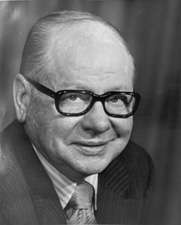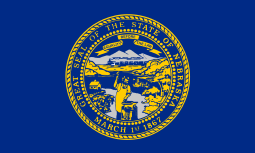Carl Curtis
Carl Thomas Curtis (March 15, 1905 – January 24, 2000) was an American politician from the U.S. state of Nebraska. He served as a Republican in the United States House of Representatives (1939–1954) and later the United States Senate (1955–1979). He remains the second-longest-serving Senator from Nebraska.
Carl Curtis | |
|---|---|
 | |
| United States senator from Nebraska | |
| In office January 1, 1955 – January 3, 1979 | |
| Preceded by | Hazel Abel |
| Succeeded by | J. James Exon |
| Member of the U.S. House of Representatives from Nebraska's 1st district | |
| In office January 3, 1943 – December 31, 1954 | |
| Preceded by | Oren S. Copeland |
| Succeeded by | Phillip Hart Weaver |
| Member of the U.S. House of Representatives from Nebraska's 4th district | |
| In office January 3, 1939 – January 3, 1943 | |
| Preceded by | Charles Gustav Binderup |
| Succeeded by | Arthur L. Miller |
| Personal details | |
| Born | Carl Thomas Curtis March 15, 1905 Minden, Nebraska, U.S. |
| Died | January 24, 2000 (aged 94) Lincoln, Nebraska, U.S. |
| Political party | Republican |
| Alma mater | Nebraska Wesleyan University |
Early life
Curtis was born on his family's farm in Kearney County, Nebraska, near the county seat of Minden. He attended public schools and later attended Nebraska Wesleyan University, where he was a member of Theta Chi.[1] He studied law on his own and passed the bar exam. He began practicing law in Kearney County and served as the county attorney from 1931 to 1934.
Career
Curtis was elected to the House of Representatives in 1938 on an anti-Franklin D. Roosevelt and New Deal platform. He served in the House from 1939 until 1954, being reelected every two years.[2] Curtis ran for the United States Senate from Nebraska in 1954 and won the election, then after incumbent Sen. Hazel Abel resigned, he was appointed on January 1, 1955, getting a two-day jump on seniority. Incidentally, the fifteenth Senate term for Nebraska's Class 2 seat, which lasted from January 3, 1949 to January 3, 1955, was unusual in that it saw six Senators serve. Curtis was the sixth and last of these. He was reelected three more times to six-year terms, serving from 1955 to 1979. Curtis voted in favor of the Civil Rights Acts of 1957,[3] 1960,[4] 1964,[5] and 1968,[6] as well as the 24th Amendment to the U.S. Constitution,[7] the Voting Rights Act of 1965,[8] and the confirmation of Thurgood Marshall to the U.S. Supreme Court.[9] Curtis was loyal to the Republican Party, particularly supporting its anti-communist stances and fiscal conservatism, which included opposition to social programs such as the New Deal and President Lyndon B. Johnson's Great Society.
During the 1963 investigation of bribery allegations against Democratic Party organizer Robert Baker, Curtis supposedly leaked a secret memorandum to advance his own positions.[10]
A close ally of both Barry Goldwater and Richard Nixon, Curtis served as floor leader during the 1964 Republican National Convention, when Goldwater won the nomination.
During the early 1970s, Curtis supported President Richard Nixon's Vietnam War escalation policy, and remained loyal to him throughout the Watergate Scandal. On August 6, 1974, two days before Nixon resigned, he implored Congress not to panic. He warned that the United States would become like a "banana republic" if Nixon was ousted in favor of Vice President Ford, who in turn would then select someone to fill the vice presidential slot. He said "this would mean both Ford and the new Vice President would be men who hadn't been elected to their high office, but merely nominated by a President under procedures for filling the vice presidency when it is vacant."[11]
Curtis served as chairman of the Senate Republican Conference from 1975 to 1979.
Later life
Following his retirement, Curtis moved to Lincoln, Nebraska, where he practiced law, served as an officer of the conservative lobby the American Freedom Coalition, and gave occasional interviews to the media.
Curtis died in Lincoln on January 24, 2000, and is interred at Minden Cemetery in Minden, his longtime hometown. Following his death, he was praised on the Senate floor in a speech delivered by Strom Thurmond, a contemporary of Curtis's who was also elected to the Senate in 1954.
References
- "CURTIS, Carl Thomas, (1905 - 2000)". Biographical Directory of the United States Congress. Retrieved October 6, 2012.
- "Carl Thomas Curtis (1905-2000)". The Political Graveyard. Retrieved October 6, 2012.
- "HR. 6127. CIVIL RIGHTS ACT OF 1957". GovTrack.us.
- "HR. 8601. PASSAGE OF AMENDED BILL".
- "HR. 7152. PASSAGE".
- "TO PASS H.R. 2516, A BILL TO PROHIBIT DISCRIMINATION IN SALE OR RENTAL OF HOUSING, AND TO PROHIBIT RACIALLY MOTIVATED INTERFERENCE WITH A PERSON EXERCISING HIS CIVIL RIGHTS, AND FOR OTHER PURPOSES".
- "S.J. RES. 29. APPROVAL OF RESOLUTION BANNING THE POLL TAX AS PREREQUISITE FOR VOTING IN FEDERAL ELECTIONS". GovTrack.us.
- "TO PASS S. 1564, THE VOTING RIGHTS ACT OF 1965".
- "CONFIRMATION OF NOMINATION OF THURGOOD MARSHALL, THE FIRST NEGRO APPOINTED TO THE SUPREME COURT". GovTrack.us.
- Phillips, Cabell (17 March 1964). "Baker Case Causes Senate Floor Fight". New York Times. Retrieved 9 October 2014.
- Rich, Spencer (August 7, 1974). "Resignation Urged By GOP Senators" (PDF). Washington Post. Retrieved November 17, 2019 – via The Weisberg Collection, Hood College, Frederick, Maryland.
External links
- United States Congress. "Carl Curtis (id: C001006)". Biographical Directory of the United States Congress.
- The Political Graveyard
| U.S. House of Representatives | ||
|---|---|---|
| Preceded by Charles Gustav Binderup |
Member of the U.S. House of Representatives from Nebraska's 4th congressional district January 3, 1939 – January 3, 1943 |
Succeeded by Arthur L. Miller |
| Preceded by Oren S. Copeland |
Member of the U.S. House of Representatives from Nebraska's 1st congressional district January 3, 1943 – December 31, 1954 |
Succeeded by Phillip Hart Weaver |
| U.S. Senate | ||
| Preceded by Hazel Abel |
U.S. senator (Class 2) from Nebraska January 1, 1955 – January 3, 1979 Served alongside: Roman Hruska, Edward Zorinsky |
Succeeded by J. James Exon |
| Party political offices | ||
| Preceded by Hazel Abel |
Republican nominee for U.S. Senator from Nebraska (Class 2) 1954, 1960, 1966, 1972 |
Succeeded by Donald Eugene Shasteen |
| Preceded by Norris Cotton |
Chair of the Senate Republican Conference 1975–1979 |
Succeeded by Bob Packwood |
| Honorary titles | ||
| Preceded by Jennings Randolph |
Most Senior Living U.S. Representative (Sitting or Former) May 8, 1998 – January 24, 2000 |
Succeeded by Edwin Arthur Hall |


